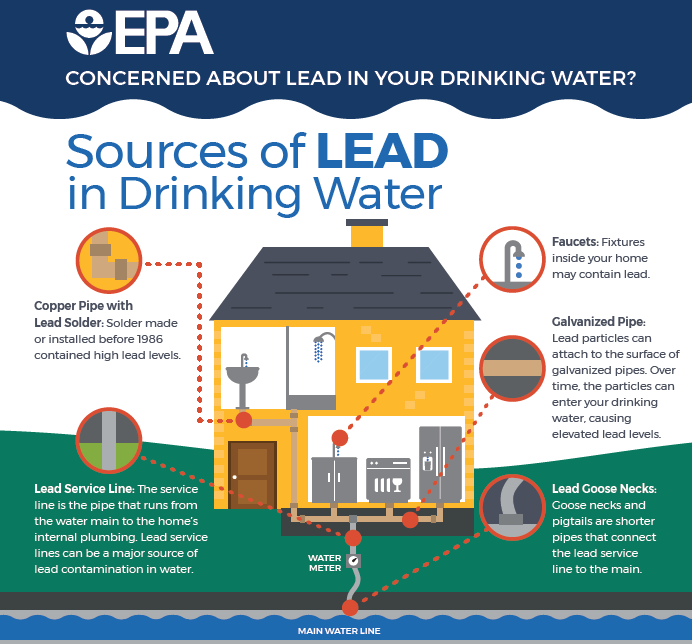Water Quality
Ensuring access to safe drinking water poses a challenge for water systems in the United States and across the globe particularly in the face of aging infrastructure, impaired source water, and limited financial resources. IAPMO is working hard with its industry partners to promote policies that help communities address their growing list of water quality challenges.
Water filter exemption from fifra requirements
Water filters are increasingly relied on to protect Americans from a host of new threats impacting water quality (e.g., lead, PFOA/PFOS, legionella, disinfection by-products (DBPs), chromium-6). Since 1975, EPA has treated water filters as pesticides and pesticidal devices . This places an unnecessary burden and cost on manufacturers, an impossible enforcement mandate on an EPA faced with more pressing pesticide issues, and more importantly does little to protect public health and safety. To protect public health and safety, water filters should be required to meet the appropriate industry standards and to be verified by independent, third-party testing and certification.
Require Certified filters be distributed in long-term disaster recovery
Section 1431 of the Safe Drinking Water Act (SDWA) grants authority to the Administrator of the EPA to take action to protect the public health when a contaminant is found in a public drinking water system and the pertinent state and local authorities have either not taken action or taken inadequate action to address the contamination. Such action may include but not be limited to requiring the “provision of alternative water supplies.” The use of bottled water may not be sustainable for an extended period of time. For water emergencies lasting more than a few weeks, an alternative water supply other than bottled water is necessary. Congress should add language to Sec 1431 of the SDWA directing EPA to provide guidance that any point-of-use filtration devices used in a water emergency are independently certified to the pertinent product standard issued by the American National Standards Institute. This is the only verifiable method to ensure that filters will reduce the level of specific contaminants in the drinking water supply and protect public health.
Expand USDA’s Section 504 home repair program
USDA's Single Family Housing Repair Loans and Grant program is vital to helping impoverished families have access to clean drinking water and sanitation. Also known as the Section 504 Home Repair program, this program provides loans to very-low-income homeowners to repair, improve or modernize their homes or grants to elderly very-low-income homeowners to remove health and safety hazards. This program is used to help families install new wells or to renovate/add a bathroom when current facilities are inadequate. Funding for this program should be increased and it should be expanded to include the installation of Point-of-Entry (POE) or Point-of-Use (POU) water filtration systems to assist families that live in areas where groundwater is contaminated.
Protect families against dangers from lead and PFAS in drinking water
The ongoing lead contamination crises in communities across the United States have shone a national spotlight on the problem of childhood lead exposure. IAPMO supports policies that protect families and children from the impact of lead in drinking water. This includes legislation that requires frequent testing of drinking water sources in schools and daycare facilities. As well as programs that assist communities in replacing lead service lines, drinking fountains, and other parts of our drinking water systems that are the source of lead.
PFAS, or per- and polyfluoroalkyl substances, are commonly referred to as “forever” compounds. They are used in a variety of industrial and consumer product applications including non-stick cookware, firefighting foams, fast food packaging, and pesticides due to their resistance to heat, water, and oil. The presence of PFAS in source water and drinking water is of increasing concern due to their widespread use and environmental persistence. Also, continued exposure to high levels of specific PFAS can lead to adverse health effects. IAPMO supports EPA’s efforts to approach the potential dangers posed by PFAs through the consistent, science-based regulatory process of the SDWA. IAPMO also supports assistance to communities impacted by high levels of PFAs to ensure safe, continual access to clean drinking water.
Water Filter inclusion in the snaps and WIC programs
IAPMO supports making changes to USDA’s Supplemental Nutrition Assistance Program (SNAP) and Supplemental Nutrition Program for Women Infants and Children (WIC) programs to allow the purchase of certified water filters. This will help to ensure that vulnerable populations are safeguarded from exposure to lead and other contaminants in their drinking water. Currently families are allowed to buy bottled water under the SNAP program and “Ready to Feed” baby formula under than WIC program to protect against lead. Allowing the purchase of water filters, is a more comprehensive and affordable solution that ensure WIC and SNAP resources ultimately go where they are intended.





